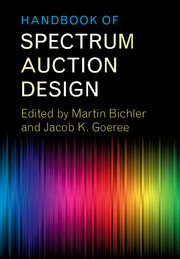Book contents
- Frontmatter
- Contents
- List of Contributors
- Preface
- List of Papers
- Part I The Simultaneous Multiple-Round Auction
- Part II The Combinatorial Clock Auction Designs
- Part III Alternative Auction Designs
- Part IV Experimental Comparisons of Auction Designs
- 25 Experiments Testing Multiobject Allocation Mechanisms
- 26 Laboratory Experimental Testbeds: Application to the PCS Auction
- 27 An Experimental Test of Flexible Combinatorial Spectrum Auction Formats
- 28 On the Impact of Package Selection in Combinatorial Auctions: An Experimental Study in the Context of Spectrum Auction Design
- 29 Do Core-Selecting Combinatorial Clock Auctions Lead to High Efficiency? An Experimental Analysis of Spectrum Auction Designs
- 30 Spectrum Auction Design: Simple Auctions For Complex Sales
- Part V The Bidders’ Perspective
- Part VI Secondary Markets and Exchanges
- Outlook
- References
28 - On the Impact of Package Selection in Combinatorial Auctions: An Experimental Study in the Context of Spectrum Auction Design
from Part IV - Experimental Comparisons of Auction Designs
Published online by Cambridge University Press: 26 October 2017
- Frontmatter
- Contents
- List of Contributors
- Preface
- List of Papers
- Part I The Simultaneous Multiple-Round Auction
- Part II The Combinatorial Clock Auction Designs
- Part III Alternative Auction Designs
- Part IV Experimental Comparisons of Auction Designs
- 25 Experiments Testing Multiobject Allocation Mechanisms
- 26 Laboratory Experimental Testbeds: Application to the PCS Auction
- 27 An Experimental Test of Flexible Combinatorial Spectrum Auction Formats
- 28 On the Impact of Package Selection in Combinatorial Auctions: An Experimental Study in the Context of Spectrum Auction Design
- 29 Do Core-Selecting Combinatorial Clock Auctions Lead to High Efficiency? An Experimental Analysis of Spectrum Auction Designs
- 30 Spectrum Auction Design: Simple Auctions For Complex Sales
- Part V The Bidders’ Perspective
- Part VI Secondary Markets and Exchanges
- Outlook
- References
Summary
Introduction
Designing combinatorial auction (CA) markets is a formidable task: Many theoretical results are negative in the sense that it seems quite unlikely to design fully efficient and practically applicable CAs with a strong game-theoretical solution concept (Cramton et al., 2006a). Experimental research has shown that iterative combinatorial auction (ICA) formats with linear prices achieve very high levels of efficiency (Porter et al., 2003; Kwasnica et al., 2005; Brunner et al., 2009; Scheffel et al., 2010). Most of these experiments are based on value models with only a few items of interest. While it is important to understand bidder behavior in small CAs, we need to know whether the promising results carry over to larger auctions, since applications of CAs can easily have more than 10 items. We ran laboratory experiments with those CA formats that have been used or analyzed for the sale of spectrum licenses, the most prominent and most thoroughly investigated application domain for CAs. However, the analysis is not restricted to spectrum sales and the results are also relevant to the design of auctions in other domains, such as procurement and transportation.We do not only observe which package bids bidders submit, but also which packages they evaluate. Interestingly, we find that auction design rules matter, but the cognitive barriers of bidders, i.e. the number of packages they evaluate, are the biggest barriers to full efficiency. These cognitive barriers have not been an issue in the experimental literature so far.
Spectrum auctions
There has been a long and ongoing discussion on appropriate auction mechanisms for the sale of spectrum rights in the USA (Porter and Smith, 2006). Since 1994, more than 70 spectrum auctions were run using the simultaneous multiround auction (SMR), an auction format which is based on work by Paul Milgrom, Robert Wilson, and Preston McAfee (Milgrom, 2000). While in the SMR auction several items are sold in a single auction, package bidding is not allowed. This leads to a number of strategic problems for bidders (Cramton, 2013), such as limited substitution of spectrum due to the activity rules employed and the exposure problem. The latter refers to the phenomenon that a bidder is exposed to the possibility that he may end up winning a collection of licenses that he does not want at the prices he has bid, because the complementary licenses have become too expensive.
- Type
- Chapter
- Information
- Handbook of Spectrum Auction Design , pp. 607 - 639Publisher: Cambridge University PressPrint publication year: 2017



